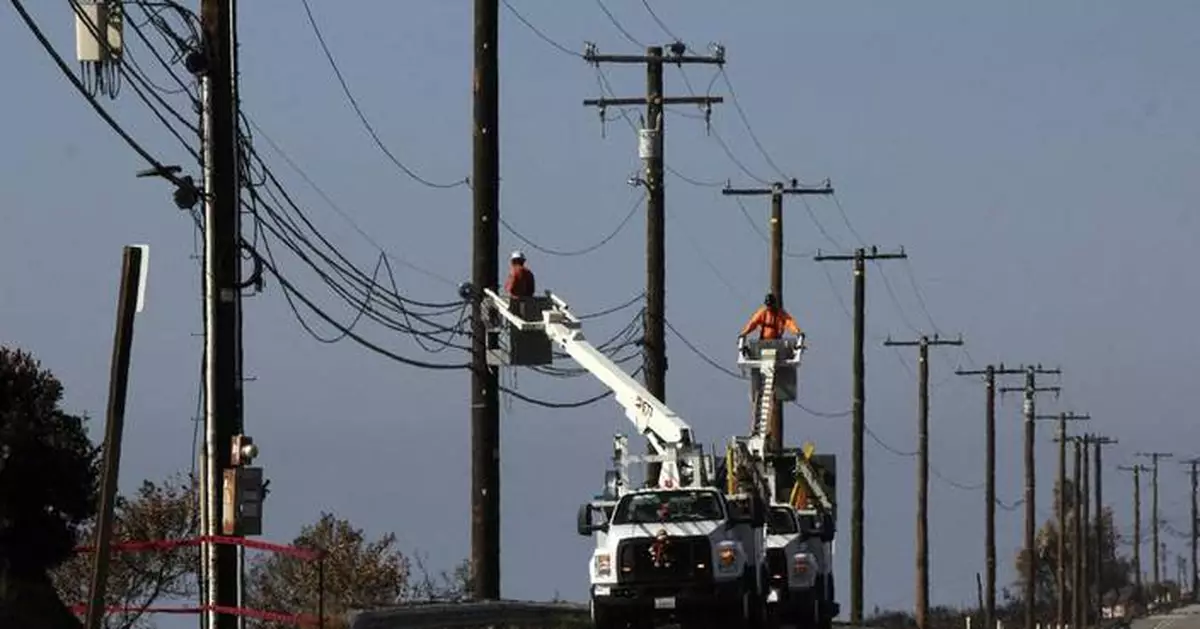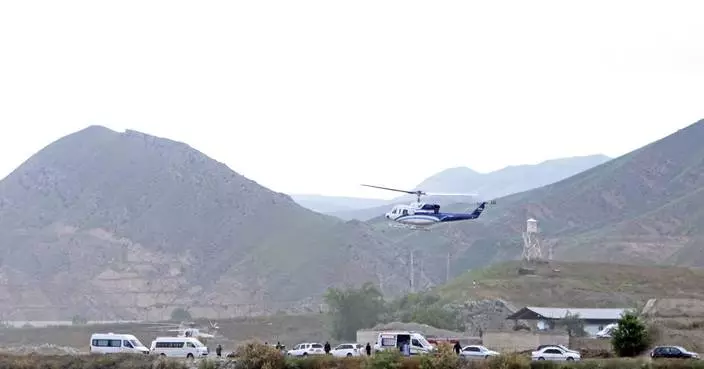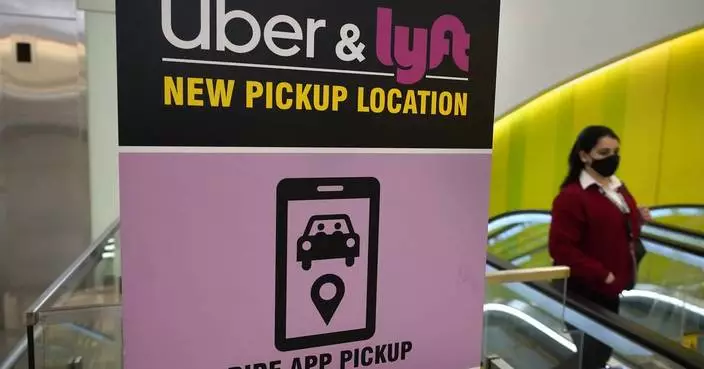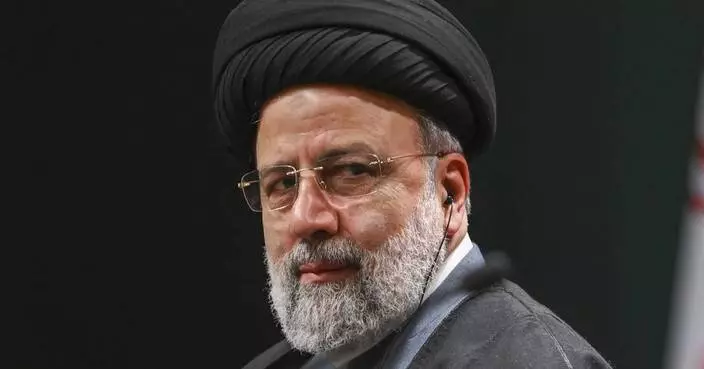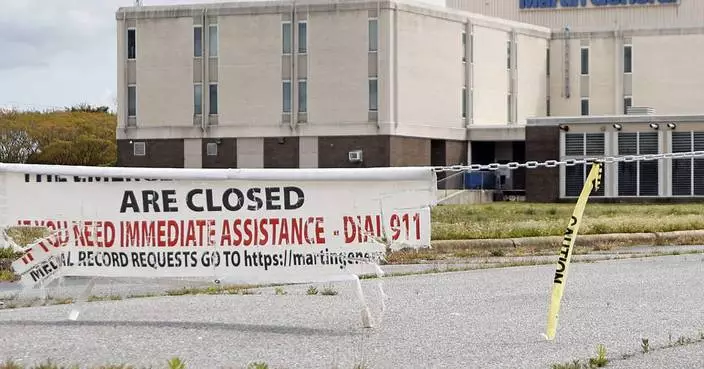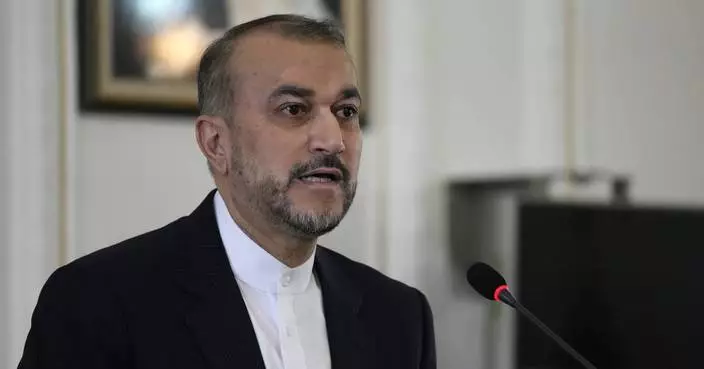SACRAMENTO, Calif. (AP) — California regulators on Thursday voted to make it cheaper for people to charge electric cars and cool their homes in the summer, a decision heralded as part of the state's transition to clean energy but derided by others who warn it will raise prices for people who don't use as much energy.
The California Public Utilities Commission voted to let the state's big investor-owned utilities — including Pacific Gas & Electric — add a fixed charge to people's power bills each month to pay for installing and maintaining the equipment necessary to transmit electricity to homes.
For most people, the charge will be $24.15 per month and will take effect starting late next year. Others with lower incomes who are enrolled in one of two discount programs will pay less, either $6 or $12 per month.
In exchange for the new charge, the price of electricity will drop by between 5 cents and 7 cents per kilowatt hour. One kilowatt hour is how much power it takes to use a 1,000-watt appliance — a coffee maker or vacuum cleaner, for instance — for one hour.
California now gets most of its energy from things like solar panels and wind turbines as opposed to burning coal and other fossil fuels that pollute the atmosphere. As a result, California's leaders have been asking residents to use more electricity than ever before.
In 2022, California accounted for 37% of the nation’s light-duty electric vehicles, or about six times more than Florida, the state in second place, according to the U.S. Energy Information Administration. The state has also pushed policies to encourage people to electrify their homes, like installing electric heat pumps and stoves.
“We’re at a time now when our climate goals are not met by necessarily using less electricity. We need to start using more electricity overall,” said Alice Reynolds, president of the California Public Utilities Commission.
For people who use a lot of energy each month, the proposal approved on Thursday will likely lower their monthly bills. People who own electric cars and have electrified their homes will save an average of between $28 and $44 per month, according to the commission. That's because the savings they get from the price drop on electricity will be more than the amount they pay for the new fixed charge.
It will also benefit people who live in areas where it gets really hot. People in Fresno — where temperatures can often exceed 100 degrees Fahrenheit (37.8 degrees Celsius) — would save about $33 running their air conditioners during the summer, according to the commission.
Using more electricity has strained the state's supply. In the summer of 2020, demand for electricity was so high that the officials had to order rolling blackouts to make sure the state didn't run out of energy.
State officials have urged people to conserve energy during peak hours, between 4 p.m. and 9 p.m. when energy from solar is less abundant. Opponents worry this proposal, by lowering the price for electricity, will discourage people from doing that.
“If you wanted to design a policy instrument that would send the signal that conservation doesn’t count, this would be it,” said Ken Cook, president of the Environmental Working Group.
Commissioner John Reynolds noted utility companies are already allowed to increase their rates during peak hours to act as an incentive to conserve.
“The idea that this fixed charge proposal will undermine the motivation to conserve is, quite frankly, laughable,” he said. "It’s a simplistic way to view this decision, and we all know that our energy situation and rate design are anything but simple."
For people who don’t use as much energy, the new fixed charge could increase their bill each month. This includes people who live in smaller apartments, have solar panels on their roofs or who live in cooler areas and don’t use air conditioning as much. That’s because for them, the decrease in the price of electricity would not be enough to offset the amount of the new monthly charge.
"It’s clear that there are better ways to reduce California’s extremely high utility rates and encourage electrification," said Stephanie Doyle, California state affairs director for the Solar Energy Industries Association.
Most states already have fixed monthly charges on utility bills to pay for maintenance and infrastructure of the electric grid. But in California — where electric rates are among the highest in the nation — any move that could increase prices for anyone raises alarms among consumers and elected officials.
A bill amended in the state Legislature on Wednesday would limit any increase in the new fixed charge to not more than the increase in inflation. It would also cap the amount of the fixed charge to a maximum of $10 beginning in 2028.
“We must do more to rein in the ever-growing cost of living in our state, not find new ways to add to it,” Republicans in the California Senate wrote in a letter urging the commission to reject the fixed charge.
The proposal is much lower than what the state's investor-owned utility companies had asked for, which was a charge between $53 and $71 per month.

FILE -- Utility crews repair overhead lines along Pacific Coast Highway just west of Malibu, Calif., on Nov. 25, 2018. On Thursday, May 9, 2024, the California Public Utilities Commission will consider a change in how the state's investor-owned utilities calculate their customers' power bills. (AP Photo/John Antczak, File)
JERUSALEM (AP) — The helicopter crash in which Iranian President Ebrahim Raisi, the country’s foreign minister and other officials were killed is likely to reverberate across the Middle East, where Iran’s influence runs wide and deep.
That's because Iran has spent decades supporting armed groups and militants in Lebanon, Syria, Iraq, Yemen and the Palestinian territories, allowing it to project power and potentially deter attacks from the United States or Israel, the sworn enemies of its 1979 Islamic Revolution.
Tensions have never been higher than they were last month, when Iran under Raisi and Supreme Leader Ayatollah Ali Khamenei launched hundreds of drones and ballistic missiles at Israel in response to an airstrike on an Iranian Consulate in Syria that killed two Iranian generals and five officers.
Israel, with the help of the United States, Britain, Jordan and others, intercepted nearly all the projectiles. In response, Israel apparently launched its own strike against an air defense radar system in the Iranian city of Isfahan, causing no casualties but sending an unmistakable message.
The sides have waged a shadow war of covert operations and cyberattacks for years, but the exchange of fire in April was their first direct military confrontation.
The ongoing war between Israel and Hamas has drawn in other Iranian allies, with each attack and counterattack threatening to set off a wider war.
It's a combustible mix that could be ignited by unexpected events, such as Sunday's deadly crash.
Israel has long viewed Iran as its greatest threat because of Tehran's controversial nuclear program, its ballistic missiles and its support for armed groups sworn to Israel's destruction.
Iran views itself as the chief patron of Palestinian resistance to Israeli rule, and top officials for years have called for Israel to be wiped off the map.
Raisi, who was a hard-liner viewed as a protégé and possible successor of Khamenei, chastised Israel last month, saying “the Zionist Israeli regime has been committing oppression against the people of Palestine for 75 years.”
“First of all we have to expel the usurpers, secondly we should make them pay the cost for all the damages they have created, and thirdly, we have to bring to justice the oppressor and usurper," he said.
Israel is believed to have carried out numerous attacks over the years targeting senior Iranian military officials and nuclear scientists.
There is no evidence Israel was involved in Sunday's helicopter crash, and Israeli officials have not commented on the incident.
Arab countries on the Persian Gulf have also long viewed Iran with suspicion, a key factor in the decision of the United Arab Emirates and Bahrain to normalize relations with Israel in 2020, and of Saudi Arabia to consider such a move.
Iran has provided financial and other support over the years to the Palestinian militant group Hamas, which led the Oct. 7 attack into Israel that triggered the Gaza war, and the smaller but more radical Palestinian Islamic Jihad, which took part in it. But there is no evidence that Iran was directly involved in the attack.
Since the start of the war, Iran's leaders have expressed solidarity with the Palestinians. Their allies in the region have gone much further.
Lebanon's Hezbollah militant group, Iran's most militarily advanced proxy, has waged a low-intensity conflict with Israel since the start of the Gaza war. The two sides have traded strikes on a near-daily basis along the Israel-Lebanon border, forcing tens of thousands of people on both sides to flee.
So far, however, the conflict has not boiled over into a full-blown war that would be disastrous for both countries.
Iran-backed militias in Syria and Iraq launched repeated attacks on U.S. bases in the opening months of the war but pulled back after U.S. retaliatory strikes for a drone attack that killed three American soldiers in January.
Yemen's Houthi rebels, another ally of Iran, have repeatedly targeted international shipping in what they portray as a blockade of Israel. Those strikes, which often target ships with no apparent links to Israel, have also drawn U.S.-led retaliation.
Iran's influence extends beyond the Middle East and its rivalry with Israel.
Israel and Western countries have long suspected Iran of pursuing nuclear weapons in the guise of a peaceful atomic program in what they see as a threat to non-proliferation everywhere.
Then-President Donald Trump's withdrawal from a landmark nuclear pact between Iran and world powers in 2018, and his imposition of crushing sanctions, led Iran to gradually abandon all the limits placed on its program by the deal.
These days, Iran is enriching uranium to up to 60% purity — near weapons-grade levels of 90%. Surveillance cameras installed by the U.N. nuclear agency have been disrupted, and Iran has barred some of the agency's most experienced inspectors. Iran has always insisted its nuclear program is for purely peaceful purposes, but the United States and others believe it had an active nuclear weapons program until 2003.
Israel is widely believed to be the only nuclear-armed power in the Middle East but has never acknowledged having such weapons.
Iran has also emerged as a key ally of Russia following its invasion of Ukraine, and is widely accused of supplying exploding drones that have wreaked havoc on Ukraine's cities. Raisi himself denied the allegations last fall in an interview with The Associated Press, saying Iran had not supplied such weapons since the outbreak of hostilities in February 2022.
Iranian officials have made contradictory comments about the drones, while U.S. and European officials say the sheer number being used in the war in Ukraine shows that the flow of such weapons has intensified since the war began.

In this photo provided by Moj News Agency, rescue teams' vehicles are seen near the site of the incident of the helicopter carrying Iranian President Ebrahim Raisi in Varzaghan in northwestern Iran, Sunday, May 19, 2024. A helicopter carrying President Raisi, the country's foreign minister and other officials apparently crashed in the mountainous northwest reaches of Iran on Sunday, sparking a massive rescue operation in a fog-shrouded forest as the public was urged to pray. (Azin Haghighi/Moj News Agency via AP)

An Iranian woman prays for President Ebrahim Raisi in a ceremony at Vali-e-Asr square in downtown Tehran, Iran, Sunday, May 19, 2024. A helicopter carrying President Raisi, the country's foreign minister and other officials apparently crashed in the mountainous northwest reaches of Iran on Sunday, sparking a massive rescue operation in a fog-shrouded forest as the public was urged to pray. (AP Photo/Vahid Salemi)

People pray for President Ebrahim Raisi in a ceremony at Vali-e-Asr square in downtown Tehran, Iran, Sunday, May 19, 2024. A helicopter carrying President Raisi, the country's foreign minister and other officials apparently crashed in the mountainous northwest reaches of Iran on Sunday, sparking a massive rescue operation in a fog-shrouded forest as the public was urged to pray. (AP Photo/Vahid Salemi)

FILE - People gather around a component from an intercepted ballistic missile that fell near the Dead Sea in Israel, Saturday, April 20, 2024. The apparent crash of a helicopter carrying Iranian President Ebrahim Raisi, the country's foreign minister and other top officials is likely to reverberate across the Middle East. Tensions have soared since the start of the Israel-Hamas war, and Israel and Iran directly traded fire for the first time ever in April. (AP Photo/Itamar Grinberg, File)

FILE - Iranian worshippers chant slogans during an anti-Israeli gathering after Friday prayers in Tehran, Iran, Friday, April 19, 2024. The apparent crash of a helicopter carrying Iranian President Ebrahim Raisi, the country's foreign minister and other top officials is likely to reverberate across the Middle East. Tensions have soared since the start of the Israel-Hamas war, and Israel and Iran directly traded fire for the first time ever in April. (AP Photo/Vahid Salemi, File)



